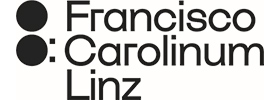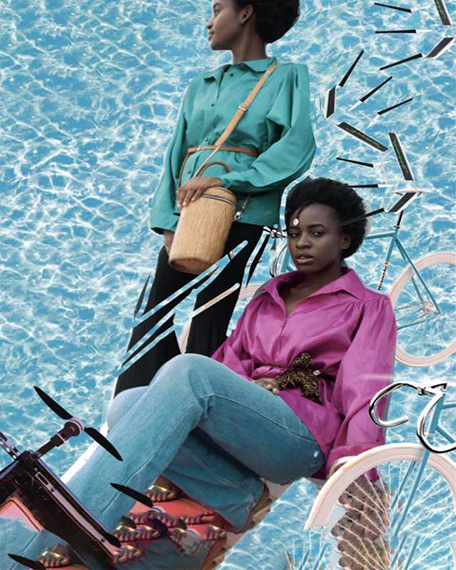
Anna Ehrenstein mit Awa Seck, DonKafele, Lydia Likibi, Saliou Ba, Nyamwathi Gichau
Foto: courtesy the artist, Office Impart and KOW Berlin
Anna Ehrenstein »
Tools for Conviviality
Exhibition: 16 Oct 2021 – 6 Mar 2022
Fri 17 Dec
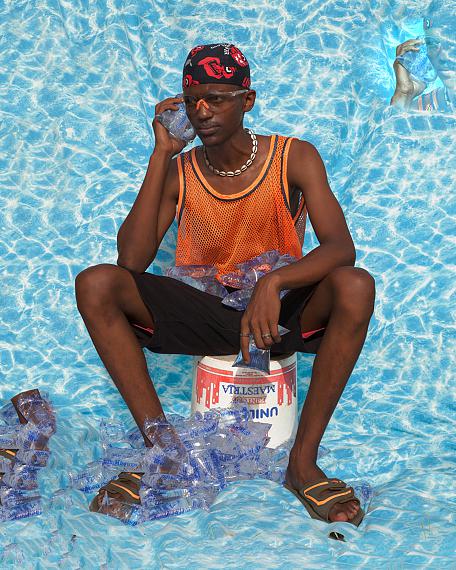
Anna Ehrenstein mit Awa Seck, DonKafele, Lydia Likibi, Saliou Ba, Nyamwathi Gichau
Foto: courtesy the artist, Office Impart and KOW Berlin
Anna Ehrenstein
"Tools for Conviviality"
Exhibition: 16 October 2021 – 27 February 2022
Anna Ehrenstein (b. 1993) found inspiration for her Tools for Conviviality during extended stays in Dakar in 2018 and 2019. In the Senegalese capital the artist met Saliou Ba, Donkafele (Mandé Mory Bah and Thibault Houssou), Nyamwathi Gichau, Lydia Likibi, and Awa Seck, all of whom would become her friends and artistic collaborators.
Ehrenstein’s own migration experience between Germany and Albania sensitized her to the living conditions of her collaborators, who all migrated at various times to or from Senegal. She views Dakar as a special place that attracts a broad spectrum of Africa’s creative diversity, in part because it is possible to work there without a visa. The artists working in the city share a life in constant motion, along with their accumulated knowledge, their joie de vivre, and a common world they have themselves created.
Anna Ehrenstein’s concept for this collaboration draws on the 1973 book Tools for Conviviality by the social critic Ivan Illich. She has taken Illich’s critique of Western industrialization and adapted it to the technocratic and neocolonial conditions of today’s digital world. "The idea that we are capable of changing how we use technology by taking advantage of what is all around us is central to Illich’s thesis and also to everyone on the team," says Ehrenstein.
For the museum rooms of the Francisco Carolinum (built between 1884-1892 by the architects Otto van Els and Bruno Schmitz), which are strongly influenced by the aesthetics of the Enlightenment, the artist built geodesic dome in which she shows a 360° video. Here she refers to Buckminster Fuller's dome architecture, which influenced the postwar critique of progress and became a classic of hippie architecture. She uses this juxtaposition of architectural concepts to raise questions. Inside the dome, textile sculptures, Cuddle Slugs, 2020, by artist Sunny Pfalzer become seating objects.
Through installations, photography, sculpture, and video, the artist addresses thematic complexes such as the relationship between necropolitics and material culture, as well as migration issues and networked imagery and ecosystems. Collaboration proves valuable here as a method for recontextualizing and thus overcoming divisions while embracing the lived reality of marginality and difference.
By staging what were once exclusively digital data and embodying them as three-dimensional "glitch assemblages" and written texts, Ehrenstein encourages a productive form of "collective unlearning."
The artist's remarks on the themes she deals with in Tools for Conviviality and a selection of relevant literature for the exhibition can be heard and read in an area designed by the art education department.
Tools for Conviviality was exhibited at C/O Berlin in 2021 on the occasion of the C/O Berlin Talent Award.
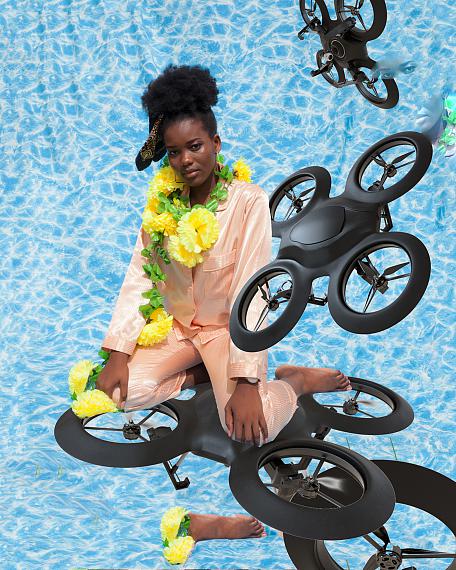
Anna Ehrenstein mit Awa Seck, DonKafele, Lydia Likibi, Saliou Ba, Nyamwathi Gichau
Foto: courtesy the artist, Office Impart and KOW Berlin
Anna Ehrenstein
"Tools for Conviviality"
Ausstellung: 16. Oktober 2021 bis 27. Februar 2022
Die Anregung zu Tools for Conviviality fand Anna Ehrenstein (*1993) bei längeren Aufenthalten in Dakar in den Jahren 2018 und 2019. Dort lernte die Künstlerin Saliou Ba, Donkafele (Mandé Mory Bah und Thibault Houssou), Nyamwathi Gichau, Lydia Likibi und Awa Seck kennen, die zu Freund:innen und künstlerischen Kollaborateur:innen wurden.
Ehrensteins eigene Migrationserfahrung zwischen Deutschland und Albanien sensibilisierte sie für die Lebensumstände ihrer Kollaborateur:innen, die von der Migration in den und aus dem Senegal geprägt sind. Dakar ist einer der Orte, welcher unter anderem durch lose Visabestimmungen ermöglicht, dass sich dort die kreative Vielfalt des afrikanischen Kontinents sammeln kann. Dort teilen die Künstler:innen ein Leben in Bewegung, ihr Wissen, ihre Freude und eine gemeinsame Welt, die sie selbst geschaffen haben.
Anna Ehrensteins Konzept für diese Zusammenarbeit geht auf das Buch Tools for Conviviality (1973, deutsch: Selbstbegrenzung. Eine politische Kritik der Technik) des Sozialkritikers Ivan Illich zurück. Die darin formulierte Kritik an der westlichen Industrialisierung passt sie dabei an die technokratischen und neokolonialen Bedingungen an, die die digitale Gegenwart prägen. "Der Gedanke, dass wir imstande sind, die Art und Weise, wie wir Technologie nutzen, zu verändern, indem wir uns auf das stützen, was uns umgibt, ist für Illich und für alle im Team von zentraler Bedeutung", so Anna Ehrenstein.
Für die Museumsräume des Francisco Carolinum (erbaut zwischen 1884–1892 durch die Architekten Otto van Els und Bruno Schmitz), welche stark von der Ästhetik der Aufklärung geprägt sind, ließ die Künstlerin eine geodätische Kuppel bauen, in der sie ein 360° Video zeigt. Sie nimmt hier Bezug auf Buckminster Fullers Kuppel-Architektur, welche die Fortschrittskritik der Nachkriegszeit geprägt hat und zum Klassiker der Hippie-Architektur wurde. Diese Gegenüberstellung architektonischer Konzepte nützt sie, um damit Fragen aufzuwerfen. Im Inneren der Kuppel werden Textilskulpturen, Cuddle Slugs, 2020, der Künstlerin Sunny Pfalzer zu Sitzobjekten.
Mittels Installation, Fotografie, Skulptur und Video bearbeitet die Künstlerin Themenkomplexe wie die Beziehung von Nekropolitik und materieller Kultur oder Migration und vernetzten Bilderwelten und Ökosystemen. Sie setzt Kollaboration als Methode ein, um Trennendes in andere Kontexte zu setzen und zu überwinden und gleichzeitig die gelebte Realität von Marginalität und Differenz anzunehmen.
Mit der räumlichen Inszenierung und Verkörperung zunächst exklusiv digital existierender Daten als dreidimensionale "Glitch-Assemblagen" und geschriebenen Texten fordert sie zu einem produktiven "kollektiven Verlernen" auf.
Ausführungen der Künstlerin über die Themen, die sie in Tools for Conviviality verhandelt und eine Auswahl relevanter Literatur für die Ausstellung können in einem von der Kunstvermittlung gestalteten Bereich gehört und gelesen werden.
Tools for Conviviality wurde 2021 im C/O Berlin anlässlich des C/O Berlin Talent Award ausgestellt.
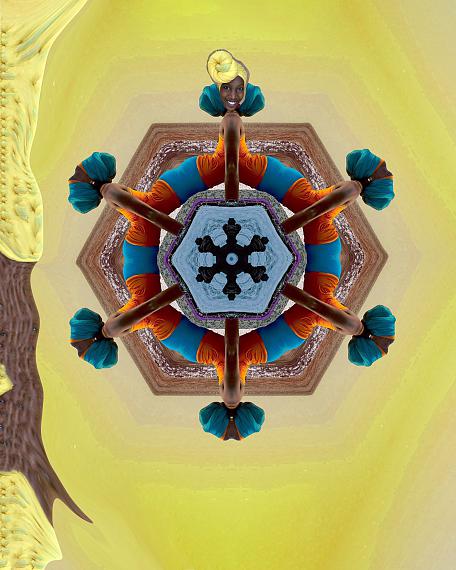
Anna Ehrenstein mit Awa Seck, DonKafele, Lydia Likibi, Saliou Ba und Nyamwathi Gichau
Foto: courtesy the artist, Office Impart and KOW Berlin
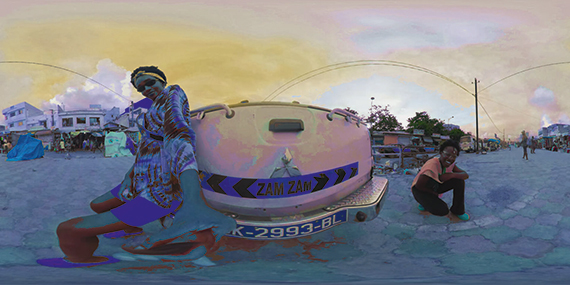
Anna Ehrenstein mit Awa Seck, DonKafele, Lydia Likibi, Saliou Ba, Nyamwathi Gichau
Foto: courtesy the artist, Office Impart and KOW Berlin
